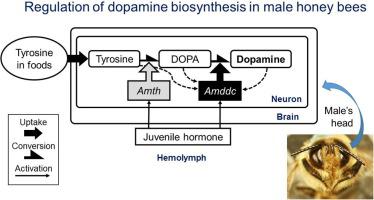Journal of Insect Physiology ( IF 2.3 ) Pub Date : 2021-06-25 , DOI: 10.1016/j.jinsphys.2021.104270 Tomohiro Watanabe 1 , Ken Sasaki 1

|
To explore the physiological mechanisms that underlie age-related dopamine increases during sexual maturation in the brains of male honey bees, we focused on the expression of genes encoding the enzymes tyrosine hydroxylase (Amth) and DOPA decarboxylase (Amddc), which are involved in dopamine biosynthesis in the brain. We hypothesized that juvenile hormone in hemolymph and tyrosine intake from food known as factors enhancing brain dopamine levels might both control the expression of genes related to dopamine production, and we tested this hypothesis in experiments. The brain levels of tyrosine and DOPA, which are precursors of dopamine, decreased as males aged, whereas the dopamine levels increased, suggesting active metabolism of dopamine precursors. The relative expression levels of Amth and Amddc were significantly higher in the brains of 4-day-old males compared with 0-day-old males, and the higher level of Amddc was maintained after 8 days. Topical application of the juvenile hormone analog methoprene enhanced the expression levels of Amth and Amddc in the brains according to the methoprene concentration. Oral intake of tyrosine enhanced the tyrosine, DOPA and dopamine levels in the brain, and activated Amddc expression in the brain, suggesting that tyrosine intake can increase both substrates and enzyme for dopamine biosynthesis. These results support our hypothesis that juvenile hormone and tyrosine intake may enhance the expression levels of genes encoding enzymes involved in dopamine biosynthesis in male honey bee brains during sexual maturation.
中文翻译:

雄性蜜蜂性成熟过程中大脑中多巴胺产生的调节
为了探索雄性蜜蜂大脑在性成熟过程中与年龄相关的多巴胺增加的生理机制,我们专注于编码酪氨酸羟化酶 ( Amth ) 和多巴脱羧酶 ( Amddc )的基因的表达。),它们参与大脑中的多巴胺生物合成。我们假设血淋巴中的保幼激素和从食物中摄取的酪氨酸被称为提高大脑多巴胺水平的因素,可能都控制与多巴胺产生相关的基因的表达,我们在实验中检验了这一假设。作为多巴胺前体的酪氨酸和多巴的大脑水平随着男性年龄的增长而降低,而多巴胺水平增加,表明多巴胺前体的代谢活跃。与0日龄雄性相比,4日龄雄性脑中Amth和Amddc的相对表达水平显着升高,Amddc水平较高8天后维持。保幼激素类似物甲氧普林的局部应用根据甲氧普林的浓度增强了大脑中Amth和Amddc的表达水平。口服酪氨酸可提高大脑中酪氨酸、多巴和多巴胺的水平,并激活大脑中Amddc 的表达,表明摄入酪氨酸可以增加多巴胺生物合成的底物和酶。这些结果支持我们的假设,即保幼激素和酪氨酸的摄入可能会提高雄性蜜蜂大脑在性成熟过程中参与多巴胺生物合成的酶基因的表达水平。































 京公网安备 11010802027423号
京公网安备 11010802027423号